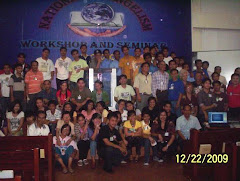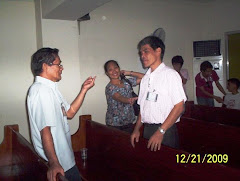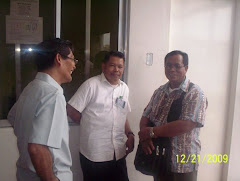 “Manhid” is one Tagalog word I learned when I first read illustrated classics written by the likes of Mars Ravelo, Pablo S. Gomez, and Mike Relon Makiling. It is the word you would hear when someone vies for your attention but your life’s dreams and acts are focused on something else. “Manhid” means insensitive. You are “manhid” if you shut your ears to the cries of the poor and the needy, when you leave the scene of the crime, when you bump someone on the trail of life and don’t apologize.
“Manhid” is one Tagalog word I learned when I first read illustrated classics written by the likes of Mars Ravelo, Pablo S. Gomez, and Mike Relon Makiling. It is the word you would hear when someone vies for your attention but your life’s dreams and acts are focused on something else. “Manhid” means insensitive. You are “manhid” if you shut your ears to the cries of the poor and the needy, when you leave the scene of the crime, when you bump someone on the trail of life and don’t apologize.
The case is the same when the prosecutors suggest technicalities, when the judges turn a blind eye, and the guilty go scot-free. In which case criminal lawyering would be a lucrative option, since pockets are lined. The victims? They can only howl: “Mga manhid kayo! Wala kayong puso” (You are all insensitive! You are heartless!).
This better of half of mine with whom I pledged “I do” (that was thirty-seven years ago!) in that private dwelling in Pasig which the late missionary Ray Bryan called home, with “Here Comes the Bride” being played to keep us in step and Felipe Cariaga pronouncing the conditions that tied us to each other for life, does not understand why I patronize that poor vendor who comes at my door with her little urchin in tow, imploring me to buy her delicacies– “they’re no good, they’re not up to standards,” my wife would say. I’d tell her I am just sensitive to the plight of the poor vendor; the profits that she makes will probably extend her business for another day, and will mean food for the family. Having been poor, I patronize the poor. As simple as that.
One is “manhid” if he observes the literalness of the law, like when he insists the church collection is only “for the saints,” invoking 1 Corinthians 16:1. It does no good to quote Galatians 6:10, “As we have the opportunity, let us do good to all men, especially to them of the household of faith”; the hobbyists go around it, too.
“Manhid” one is not when someone points out to him why he posted the writings of an “evil man” on his blog. “Evil” is the word the commentator used to describe the man, and says that that man also has left a trail of abusive relationships in the past. Well, the blog owner happens to believe that everyone who may have a penchant to do evil also has the capacity to do good. Since the blog owner is not insensitive, he does what makes his reader happy.
Sensitive to issues. Sensitive to cries. Sensitive to the environment. The hair that lines the skin is there for a reason: It jolts you back to your senses and makes you feel the coolness, or the coldness, of the surrounding, giving you the option to put in more firewood to the stove, or die of hypothermia. Sensitive to logic. The heart that the Bible talks about is not that hollow muscular organ that receives blood from the veins and propels it through the arteries; it is the brain where thoughts are conceived and filtered and logic is molded and where action is prodded by what’s best under the circumstances.
Be sensitive to calls for action. Calls from men sermonizing on the pulpits and from the Word raging in its urgency in the privacy of your bedroom, speaking to your heart to stop sinful actions. Calls for help for needy Christians. I believe we have wasted much time arguing on the methods, we have misspent precious hours logicalizing the madness of our hermeneutics, when true hermeneutics begins when one truly listens to what God in His Scripture says.
It matters much to the Lord that we act right, and with dispatch. That is the essence of human sensitivity.
 To this young man named Julie, I am always “Pastor Ed,” and he would not listen to corrections. With him and his wife, I had much time to study the Word. They had scant time to sit down with me in their home but they were good listeners, observing and absorbing everything they heard from me. Both spent much time in the pechay patch that Julie had carved out of a mountainside. Sometimes he would drive a motorcycle-for-hire, taking passengers on pleasure trips to Mount Manunggal, but always you would find Julie and his wife in their garden patch. It was there too that I would conduct my Bible class.
To this young man named Julie, I am always “Pastor Ed,” and he would not listen to corrections. With him and his wife, I had much time to study the Word. They had scant time to sit down with me in their home but they were good listeners, observing and absorbing everything they heard from me. Both spent much time in the pechay patch that Julie had carved out of a mountainside. Sometimes he would drive a motorcycle-for-hire, taking passengers on pleasure trips to Mount Manunggal, but always you would find Julie and his wife in their garden patch. It was there too that I would conduct my Bible class.
Slender and somewhat tall, Julie’s moods and ways may swing with his environment, including its sadness and its pains, but he has always believed that laughter is the best medicine even for back-ache. And it seems both of us and those who join our circle never get older day by day.
A year ago he put an end to his life as a pechay planter. Business had not been good and the weather had been so unkind. So stop planting. Diversify. Then I saw him tending sheep and goats owned by one rich man. And so amidst the cacophony of bleating goats and blah-ing sheep, we put finishing touches to a dream by putting an end to that dream—the vegetable truck farm we had envisioned over cups of coffee during days and nights of rain that detained me in this mountain lair never saw reality. You are now a pastor of goats and sheep, I said. That’s good.
I encouraged him to get a license to drive; he did. I urged him to learn driving a jeepney and he became an expert in it.
And so the dreams of youth that I had and which I laid out before Julie’s eyes became his dreams too. His wife underwent training to become a sewer of ready-to-wear garments. Then he told me his wife had been accepted to work in a garment factory. I said good. That means she would stay in the city and you’d remain in this mountain lair of yours– far from the madding crowd, far too from the economy that moves. “She would be working seven days a week with half of a day of rest,” he said, “and that rest is not on Sunday. And she would be allowed to come home only once a month.” Wow, how can you manage that? I asked.
Listen, I told him. These are trying times. The city is full of lights but there are sons of darkness prowling in its every corner. These will try your souls; these will try your marriage too, if it is meant to survive. Both of you are still young– she’s 19 and you’re 22. And remember, you have a pretty woman for a wife. Take good care of her, and that takes care of your marriage.
Last Sunday I was back. I was told that Julie’s wife is now on her first day on the job. But Julie and his daughter too were nowhere to be seen. Where are they, I asked. “He resigned,” Edward said.
And Edward told me why: It is because of the “Pasi-aw ni Pastor Ed” (”The joke of Pastor Ed”).
What I said about his wife and his marriage set Julie into thinking. It was not meant as a joke.
The family is now in the city. He’ll drive jeepneys if not tricycles, and he would be near her– to keep their marriage intact.
 Tata. That was how he was introduced to me. In Ilocano, he would be “Balong.” In Cebuano, he would be “Dodong.” He is an Ilonggo from South Cotabato. “Tata” literally means “little child.” When I first met him, he was 27 years old, married, and had a baby of his own named “Toto,” “little boy.” Tata and I speak the same dialect. His parents were from Negros Occidental, the province whose name to me often evokes nostalgia.
Tata. That was how he was introduced to me. In Ilocano, he would be “Balong.” In Cebuano, he would be “Dodong.” He is an Ilonggo from South Cotabato. “Tata” literally means “little child.” When I first met him, he was 27 years old, married, and had a baby of his own named “Toto,” “little boy.” Tata and I speak the same dialect. His parents were from Negros Occidental, the province whose name to me often evokes nostalgia.
Tata’s wife is named N, and she’s from this side of the mountain where I go in and out preaching the Word. From his story I surmised that she was a woman full of ambitions.
Theirs was a whirlwind romance. He started courting her one day when their paths met. He was tired and thirsty and she guided him to that nook behind a forest where a bubbling spring could be found. They began a conversation that lasted until noon. He was struck by the beauty of this mountain lass, with her features so fine she could be mistaken for an “hija bastarda.” It never occurred to Tata that while they both shared the same attraction, they would never share the same faith, or dreams, or goals. After a week of courtship, she became his wife.
I had studied the Bible with Tata many times. He listened, understood the logic underscoring the teachings of the Scriptures, and began to see the light. After a few months, he was on his way to become a disciple like the one he reads about in the Bible. Tata lacked just one thing. But then I was ready to immerse him– if he was ready too. He said he was.
Tata’s wife got herself a job in the city, first as a lady security guard for a grocery store, then as a factory worker at MEPZA. At the time we were having studies, his wife had already been away for a month.
Tata never came to the baptismal pool as scheduled. His wife had left for a job which she thought was good as far as economics was concerned, but she also left him for another man. He was so downhearted.
I saw him again three months after. He came for advice. In the kindest way possible, I frankly told him three things that were wrong.
First, He had fallen in love with a woman who was not even in love with him. Love in a marriage is a two-way traffic. She was a Delilah in disguise. You remember that Bible story.
Second, their home started in the wrong nest. After their wedding, her parents’ home became their home. What does the Word of God say about spouses leaving parents and cleaving to each other alone?
Third, their marriage was without any moral foundation. Tata strived to listen to Jesus and obey Him; his wife never had a qualm about doing anything immoral.
It’s been three years since Tata and I last saw each other. He’s back in South Cotabato, trying to pick up the pieces of his life and restructure it. I miss that friend of mine, even as I pass by a big mansion on my way out—another imposing structure in this forest land, where Tata’s ex-wife now reigns as queen. The cost? Just three million pesos. Built for her by her new lover. She was twenty-five. He was sixty-five.
Tata, on the other hand, found the church in South Cotabato.
 What is it about this little boy, seven years old, who keeps me wanting to have him always by my side? We never invited him to be a part of the family; we never expected him. But he came anyway.
What is it about this little boy, seven years old, who keeps me wanting to have him always by my side? We never invited him to be a part of the family; we never expected him. But he came anyway.
And we love him. Oh, how we love him! Never a day would pass without us in the family expressing this heartfelt emotion toward him and embodying that emotion with acts of love. It is not just money and toys, it is money and toys wrapped in tenderness. It is not just McDonalds and Jollibees, or electric train, or the colored TV; it is these that when attached to the act show that he is the most loved persona in the household.
And so he holds that special place. He is not content of me being just his grandfather, he wants me take on the role of the man whom he saw only once or twice in his life, the father he wants to be with but never wants to see. We in the family always wish the boy well. And in our wish, we desire that he will turn into something still lovable in our eyes. For is it not, that when a man grows old, he either grows into the most hated man or the man most loved? We wish him to be the man we always desire to be, but have not been. And that desire moves us to have him turned into a man who will have a healthy respect for the father he never misses.
We will, that he too shall become a man who is never afraid of his past. For his past we have accepted, as we have accepted ours.
We will too, that in these times when some morals are bankrupt, he shall be filled with it; that he will grow up as a God-fearing man, a lover of good, a promoter of what is best, a persevering fellow who keeps toiling in silence and in the midst of difficulties when others may do it in pomp and in ease.
We will, that he shall not be a lover of money and favors, and that he shall disperse of these only to the deserving and the needy.
It is the grace of God that favors his arrival into this world; and it is that grace that has changed our perception of family. Begotten by the daughter who is the apple of our eye, his coming has changed us all. We wish that he will not change as the most lovable boy the Lord has ever gifted us.
His name is Charles Jacob, and if you ever have a chance, I want you to meet him too.
 Talk about high school. What does one remember about it? I don’t put mine in the class of the Very Significant, or the Very Memorable. Others recall theirs with sadness or with joy; mine with the lesson that it has brought me.
Talk about high school. What does one remember about it? I don’t put mine in the class of the Very Significant, or the Very Memorable. Others recall theirs with sadness or with joy; mine with the lesson that it has brought me.
That noon time of my last year in high school was just like other noon times of my life. I was sitting there under a kaymito tree behind the school library. It was no ordinary tree, as far as I am concerned, for it was the biggest, the tallest, and perhaps the oldest kaymito tree in the whole village. Its crown had withstood many tropical storms of history. Nobody ever thought of cutting it down even to give way to the walls being built around the school’s property. For that tree was part of the will on the property deeded to the school. And so it stayed.
And so I also stayed. Hiding behind the lowest branch that stooped like an arch, I sat under it. I was there munching the ripe fruits that I could lay my hands on. It was the best lunch I had ever had, since nobody was watching, and nobody saw what I was doing. Or so I thought.
Except that I heard some steps. Someone grabbed me from behind, and pushed me to the ground. There he was: the teacher of my terrifying dreams. Playing the role of safe keeper of the olden kaymito.
What followed was the usual. This was not my first time to be brought to the office of the principal. I was his greatest quarry, the top guy of the graduating class, caught with his pants down.
Never mind if the principal had forgiven me. Never mind if I only got a warning. The principal understood the plight of the poor, he having been a poor scholar himself subsisting on the fruits of the tree he had never planted. He knew that the only lunch I could get in those days of poverty was kaymitos. He forgave me. But the safe keeper of the olden kaymito did not.
In the years that followed I became a searcher of truth. I searched for the meanings of want and bounty, why some people had it more while others had none. In my search for truth, I also found God. As a minister of the gospel, I also understood why people acted so and so.
I had been back to the village school one time. The safe keeper of the kaymito was at his yard, stooped by years of service. The principal was not, for I saw his tomb that day. But he made it known to all before he left, that no one should ever be denied of the fruits of any tree in the school grounds, especially if he is hungry. The safe keeper of the kaymito understood it too late. But now he was smiling at me.
 “Manhid” is one Tagalog word I learned when I first read illustrated classics written by the likes of Mars Ravelo, Pablo S. Gomez, and Mike Relon Makiling. It is the word you would hear when someone vies for your attention but your life’s dreams and acts are focused on something else. “Manhid” means insensitive. You are “manhid” if you shut your ears to the cries of the poor and the needy, when you leave the scene of the crime, when you bump someone on the trail of life and don’t apologize.
“Manhid” is one Tagalog word I learned when I first read illustrated classics written by the likes of Mars Ravelo, Pablo S. Gomez, and Mike Relon Makiling. It is the word you would hear when someone vies for your attention but your life’s dreams and acts are focused on something else. “Manhid” means insensitive. You are “manhid” if you shut your ears to the cries of the poor and the needy, when you leave the scene of the crime, when you bump someone on the trail of life and don’t apologize.





































